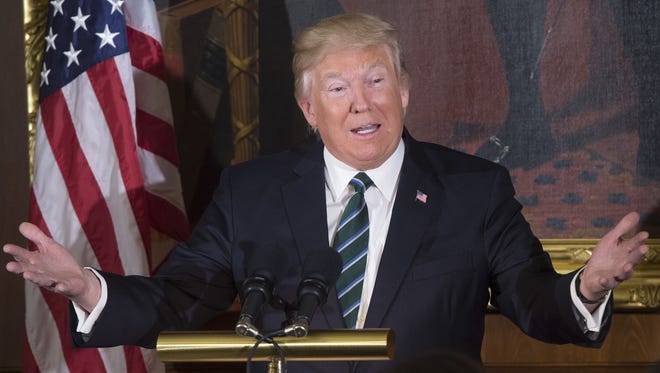What happens next for President Trump's first budget?
WASHINGTON — President Trump rolled out his dramatic budget proposal Thursday, with huge cuts to domestic programs and huge increases in defense spending. But will it ever actually become law? Presidents don't get to decide federal spending by themselves; that's up to Congress.

What happens now?
Different congressional committees in both the House and Senate will hold hearings on proposed budgets for departments within their jurisdictions. Proposed cuts are expected to draw opposition from members of both political parties. Congress — in theory — will draw up 13 separate spending bills to fund the various agencies of the government. But it has been decades since Congress has been able to complete this process; generally it breaks down in the summer and lawmakers end up passing one giant spending bill sometime near the end of the calendar year.
What about the White House?
It is preparing more budget plans. Thursday's proposal is what aides call a "skinny budget," focusing on discretionary spending, with very little detail. A fuller budget proposal in May will include tax policy and spending on entitlement programs like Social Security and Medicare.
Will the Trump plan pass Congress?
No — and that's not unusual. Congress uses the president's budget as a starting point for writing its own bills. Since Republicans control the House, the Senate and the White House, there is a better chance this year that the final bill will look something like the president's outline than there is in times when the White House and Congress are held by different parties.
What have leaders in Congress said about the president's plan?
House Speaker Paul Ryan, R-Wis., said the budget was a shift in the right direction after eight years of Democratic blueprints from the White House.
"We are determined to work with the administration to shrink the size of government, grow our economy, secure our borders, and ensure our troops have the tools necessary to complete their missions," Ryan said.
Senate Minority Leader Charles Schumer of New York signaled that Democrats would fight the proposal tooth-and-nail.
“The very programs that most help the middle class are those that get clobbered the hardest: investments in infrastructure, education, scientific research that leads to cures for diseases all take big hits" Schumer said. “Democrats in Congress will emphatically oppose these cuts.”
When will the rubber hit the road?
The White House spending plan would fund the government for fiscal year 2018, which begins Oct. 1 of this year. In theory, lawmakers in Congress face a deadline of Sept. 30 to pass the appropriations bills to fund the various federal agencies and programs.
But if that process breaks down as usual, it may be the end of the year before any of the changes Trump wants actually begin to take effect.
Meanwhile, the White House has also offered a "supplemental" budget request that would boost defense spending by $30 billion for the rest of 2017 and an additional $3 billion for immigration enforcement and border security. That bill will be taken up separately by Congress, presumably in the next few weeks.
More USA TODAY coverage of Trump's budget proposal:
Trump's first budget slashes education, health spending to make way for military buildup
Trump's federal budget would eliminate dozens of agencies and programs
Trump's budget blueprint faces heavy opposition
Trump's NASA budget preserves Mars mission, cuts Earth science, asteroid trip, education
Trump's budget directs $2.6 billion to border wall — and that's not all
Trump proposes to hike TSA fee on airline tickets
Trump proposes to privatize air-traffic control
